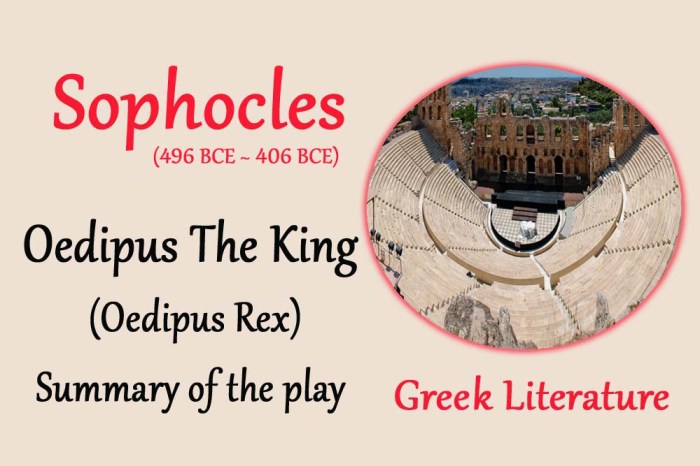Oedipus rex scene 2 summary – In Oedipus Rex Scene 2, the plot thickens as Oedipus embarks on a perilous journey to uncover the truth behind a devastating plague. Join us as we delve into this pivotal scene, unraveling the complexities of Oedipus’s character, the significance of the plague, and the dramatic techniques that bring this ancient tragedy to life.
Oedipus’s unwavering determination to solve the mystery of Laius’s murder sets in motion a chain of events that will forever alter the fate of Thebes.
Scene Overview
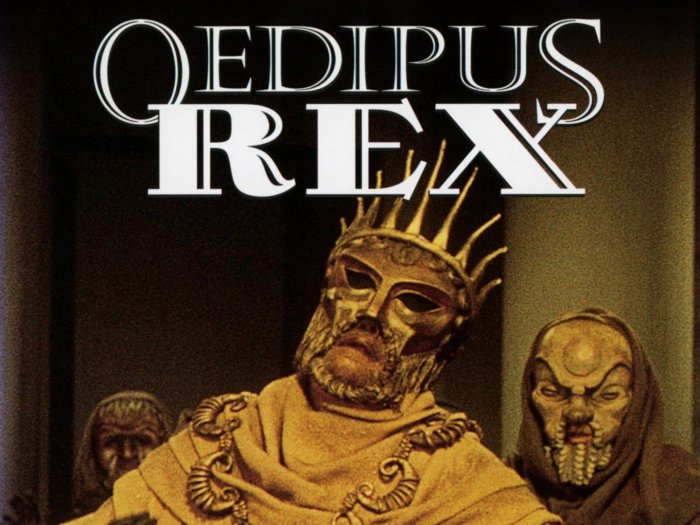
In Scene 2 of Oedipus Rex, Oedipus interrogates Tiresias, the blind prophet, to uncover the truth behind the plague ravaging Thebes. Tiresias initially resists revealing the prophecy, fearing for his safety. However, Oedipus’s persistent questioning and threats force him to speak.
Tiresias declares that Oedipus himself is the source of Thebes’s suffering. He accuses Oedipus of unknowingly murdering his father, Laius, and marrying his mother, Jocasta. Horrified by this revelation, Oedipus refuses to believe Tiresias and accuses him of conspiring with Creon to overthrow him.
Key Characters
- Oedipus: The king of Thebes, who is determined to find the truth behind the plague.
- Tiresias: A blind prophet who possesses the gift of foresight but fears revealing the prophecy.
- Creon: Oedipus’s brother-in-law and advisor, whom Oedipus suspects of treachery.
Oedipus’s Characterization
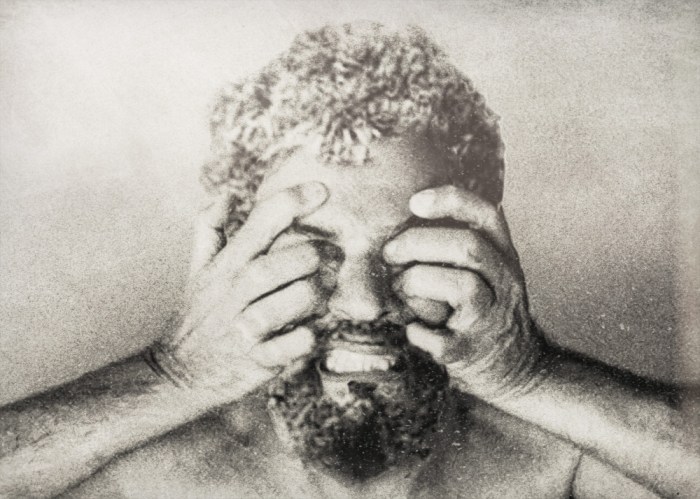
In Scene 2 of Oedipus Rex, Sophocles paints a complex portrait of Oedipus, the tragic hero. Through his interactions with Creon and the Chorus, and his own emotional turmoil, Oedipus’s personality and motivations become evident.
Oedipus’s Interactions
Oedipus’s interactions with Creon and the Chorus reveal his character traits. He is impulsive and quick to anger, as seen when he accuses Creon of treachery without evidence. However, he also shows moments of vulnerability and doubt, particularly in his conversation with the Chorus, where he expresses his fears and anxieties about the plague.
Oedipus’s Emotional State, Oedipus rex scene 2 summary
Oedipus’s emotional state is central to his characterization. He is consumed by a desire for knowledge and truth, which leads him to pursue the investigation of Laius’s murder relentlessly. However, his pride and arrogance blind him to the truth and ultimately lead to his downfall.
The Plague and its Significance
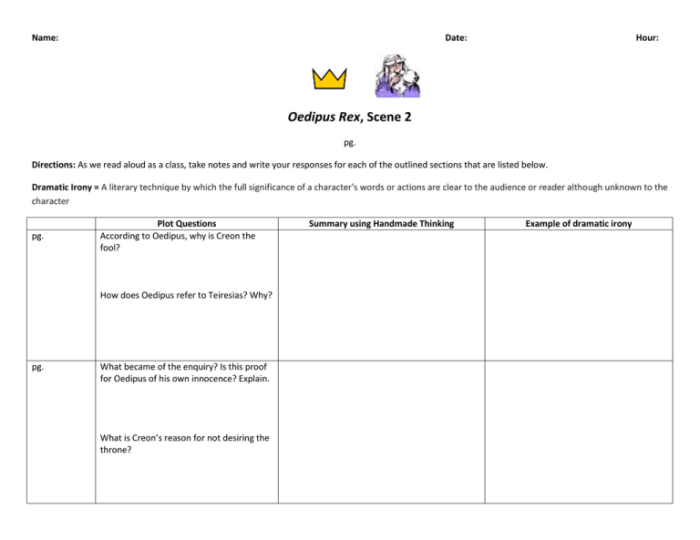
The plague that has ravaged Thebes has left a devastating impact on the city and its people. The once-prosperous city is now a shadow of its former self, with the streets deserted and the air filled with the stench of death.
The plague has claimed countless lives, leaving behind a trail of grief and despair.
The plague is not merely a physical affliction; it is also a manifestation of the city’s moral corruption. The people of Thebes have been plagued by hubris and arrogance, and the gods have sent the plague as a punishment for their sins.
The Plague’s Link to Oedipus’s Past Actions
The plague is directly linked to Oedipus’s past actions. Oedipus unknowingly killed his father, Laius, and married his mother, Jocasta. These crimes have angered the gods, and they have sent the plague to punish Thebes.
The Role of the Gods
The gods play a central role in the unfolding events of the play. They are the ones who have sent the plague to Thebes, and they are the ones who will ultimately determine Oedipus’s fate.
The Search for the Truth: Oedipus Rex Scene 2 Summary
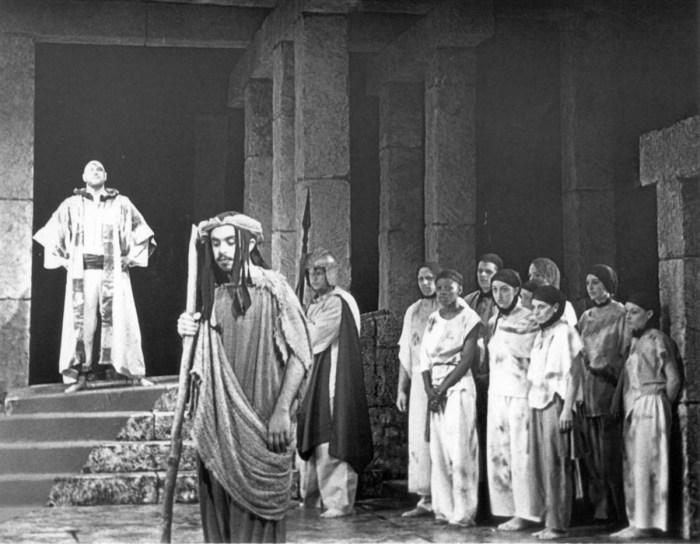
Oedipus’s relentless pursuit of the truth behind Laius’s murder is driven by a complex interplay of motives. His desire for knowledge, coupled with his fear of the truth, sets him on a perilous journey that will ultimately lead to his downfall.
Obstacles and Methods
Oedipus faces numerous obstacles in his search for the truth. The citizens of Thebes are reluctant to speak out against the king, fearing retribution. Additionally, the Oracle of Delphi’s cryptic prophecies add to the confusion and uncertainty surrounding the murder.
Despite these challenges, Oedipus employs various methods to uncover the truth. He interrogates witnesses, analyzes clues, and seeks the guidance of the blind prophet Tiresias. His relentless determination to uncover the truth, even when it threatens his own well-being, is a testament to his unwavering pursuit of justice.
Tension between Desire and Fear
Throughout his investigation, Oedipus grapples with the tension between his desire for knowledge and his fear of the truth. He fears that the revelation of Laius’s killer will implicate him in the crime. Yet, his relentless pursuit of justice compels him to confront the truth, no matter how painful it may be.
This inner conflict adds a layer of dramatic tension to the play. Oedipus’s journey is not simply a search for facts; it is also a psychological exploration of the human condition, the struggle between our desire for knowledge and our fear of the consequences.
In Oedipus Rex Scene 2, the citizens of Thebes plead with Oedipus to save them from the plague. Oedipus promises to do everything in his power and sends Creon to consult the oracle at Delphi. As we wait for Creon’s return, let’s take a moment to reflect on the power of memory, as captured in the poignant poem “I Remember” by Edward Montez ( i remember by edward montez ). Montez’s words remind us that even in the face of tragedy, our memories can provide solace and strength.
Returning to Oedipus Rex Scene 2, Creon returns with the oracle’s prophecy, setting in motion the tragic events that will follow.
Dramatic Techniques
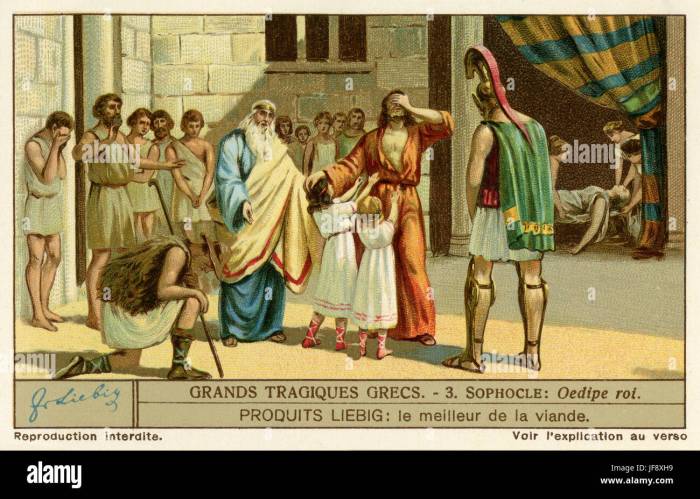
Scene 2 of Oedipus Rex employs various dramatic techniques to heighten its impact and enhance the audience’s engagement.
Foreshadowing
Foreshadowing is used throughout the scene to hint at the impending tragedy. For instance, Oedipus’s confident declaration that he will find the killer foreshadows his eventual discovery of his own guilt.
Irony
Irony is also prevalent in the scene. Oedipus’s repeated insistence on finding the truth is ironic given that he is the one responsible for the crime he seeks to uncover.
Symbolism
Symbolism is used to represent deeper meanings. The plague that afflicts Thebes symbolizes the moral and spiritual corruption that has infected the city. Oedipus’s blindness, both physical and metaphorical, symbolizes his inability to see the truth about himself.
These dramatic techniques work together to create a sense of suspense, dread, and inevitability. They prepare the audience for the tragic events that are to come and enhance the emotional impact of the play.
FAQ Summary
What is the significance of the plague in Scene 2?
The plague symbolizes the moral and spiritual corruption that has infected Thebes due to the unsolved murder of Laius.
How does Oedipus’s character evolve in this scene?
Oedipus’s initial confidence and determination gradually give way to doubt and fear as he uncovers the truth about his past.
